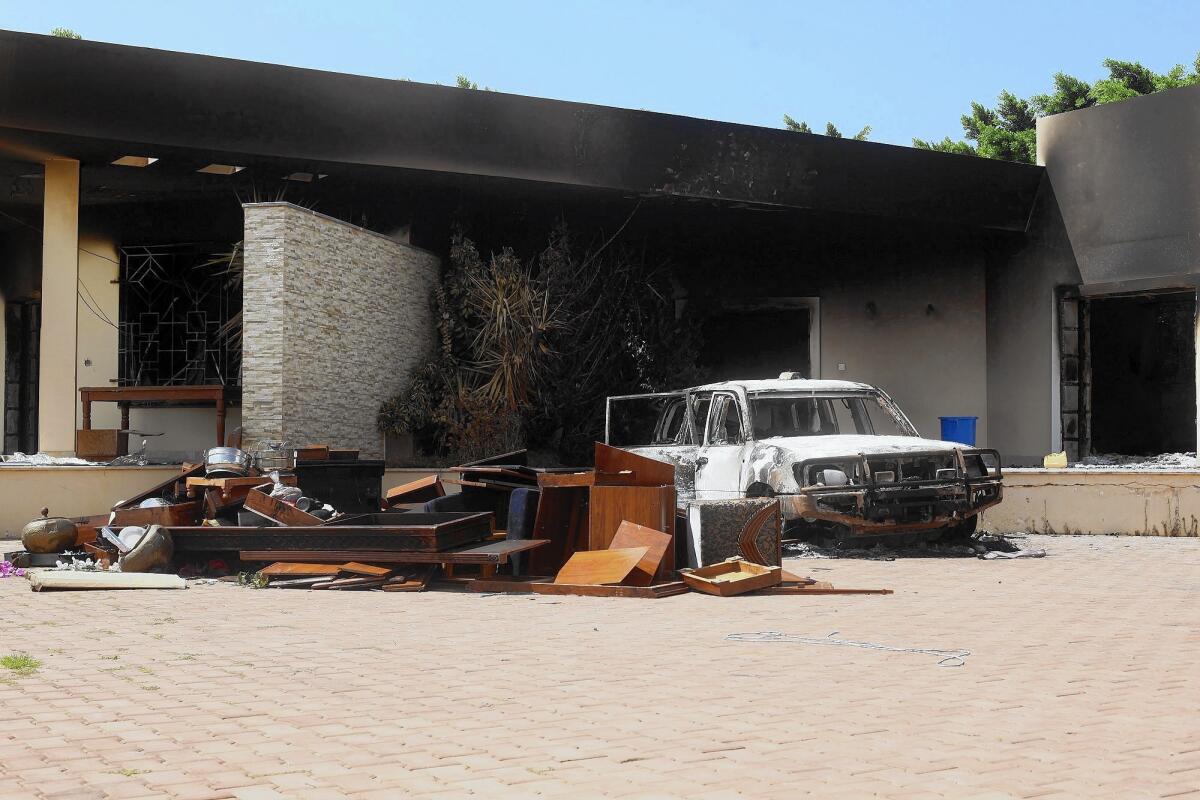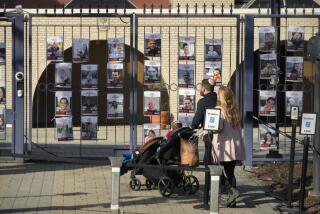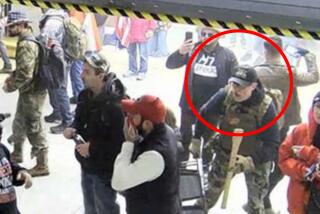Suspect indicted in Benghazi attack that killed U.S. ambassador

Ahmed Abu Khatallah, who is suspected of helping direct the Sept. 11, 2012, attack on the U.S. diplomatic mission in Benghazi, was indicted Tuesday as the “leader of an extremist military group” who conspired to carry out the fiery ambush that killed the U.S. ambassador to Libya and three other Americans.
Abu Khatallah, the only person taken into U.S. custody in the assault, could face the death penalty if convicted. He faces a total of 18 charges, including counts of murder “in the course of an attack on a federal facility.”
The federal indictment identified Abu Khatallah as the “commander of the Ubaydah Bin Jarrah, an Islamist extremist militia in Benghazi which had the goal of establishing sharia law in Libya.”
The group merged in 2011 with Ansar al Sharia, another Islamist extremist entity, and Abu Khatallah became the “Benghazi-based leader” of the combined organization, according to the indictment.
Abu Khatallah, who is in his early 40s, has four aliases, including “the Sheik,” according to prosecutors. He was captured in June by U.S. military and FBI agents in Libya, brought to Washington and charged in a criminal complaint.
Since then, a federal grand jury in Washington has weighed evidence about the arson and gunfire at the U.S. diplomatic compound in Benghazi that killed Ambassador J. Christopher Stevens and an aide, Sean Smith. Two former Navy SEALs were killed early the next morning in a mortar attack on a nearby CIA compound.
According to the indictment, Abu Khatallah believed the diplomatic mission where Stevens was staying “was actually being used to collect intelligence [and] he viewed U.S. intelligence actions in Benghazi as illegal and that he was therefore going to do something about this facility.”
On the night of Sept. 11, 2012, he drove to the mission with “other attackers,” including about 20 armed men who were his “close associates,” the charges state.
Under his direction, they “violently breached the main gate.” As fires raged and gunshots rang out in the compound, Abu Khatallah “actively participated … by coordinating the efforts of his conspirators and turning away emergency responders,” the indictment charges. The gunmen plundered U.S. documents, maps and computers.
Later that night, a group of heavily armed men attacked a CIA-run compound about a mile away. A mortar attack there killed security contractors Tyrone Woods and Glen Doherty.
“These new charges reflect Ahmed Abu Khatallah’s integral role in the attack on the U.S. facilities in Benghazi,” Atty. Gen. Eric H. Holder Jr. said Tuesday.
The Justice Department has been criticized for the slow pace of the investigation — more than two years have gone by. But Holder said the indictment signaled that “those who do harm to our citizens, no matter how far away, should understand our nation’s memory is long and our reach is far.”
The case has reignited partisan debate about the response to the 2012 attacks and the Obama administration’s approach to handling terrorism suspects. Some Republican lawmakers have argued that Abu Khatallah should be held at the U.S. prison at Guantanamo Bay, Cuba, because he is a potential “enemy combatant.”
Abu Khatallah has been held in Alexandria, Va., and will be tried in a civilian court just across the Potomac River from Capitol Hill.
Speaking to reporters, U.S. Atty. Ronald C. Machen Jr. pledged to continue hunting down Abu Khatallah’s conspirators.
“We will press forward with our efforts to hold accountable all those who are responsible for this cowardly act,” Machen said.
Abu Khatallah has pleaded not guilty to the earlier one-count complaint. He is scheduled to be arraigned Monday on the new indictment.
Twitter: @RickSerranoLAT
More to Read
Start your day right
Sign up for Essential California for news, features and recommendations from the L.A. Times and beyond in your inbox six days a week.
You may occasionally receive promotional content from the Los Angeles Times.







